The cryptocurrency industry continues to evolve at an unprecedented pace, with digital asset exchanges serving as the backbone of this revolutionary ecosystem. As entrepreneurs and businesses recognize the immense potential of the crypto market, many are exploring the possibility of launching their own trading platforms. However, one of the most critical questions that arise is: what is the estimated cost for crypto exchange development?
Understanding the estimated cost for crypto exchange development is essential for making informed business decisions and securing adequate funding for your project. The investment required varies significantly based on numerous factors, including exchange type, features, security measures, and regulatory compliance requirements. This comprehensive guide will explore every aspect of cryptocurrency exchange development costs, helping you plan your budget effectively. Learn the Top 10 Meme Coin Marketing Strategies for Maximum Hype and Best Meme coin Marketing Services.
Types of Cryptocurrency Exchanges and Their Costs
Centralized Exchanges (CEX)
Centralized exchanges are the most popular due to their high liquidity, fast transaction speeds, and user-friendly interfaces. Crypto exchange development for centralized systems costs $150,000 to $1,000,000 or more, depending on features and complexity. Here are the estimated cost for crypto exchange development.
Key Centralized Exchange Costs:
- Core trading engine development: $50,000–$200,000
- User interface/experience design: $30,000–$100,000.
- Security infrastructure: $40,000–$150,000
- Compliance features: $25,000–$100,000.
- Payment gateway integration: $20,000–$80,000
Decentralized Exchanges
Peer-to-Peer (P2P) Exchanges
Direct trading without intermediaries is possible on P2P exchanges. A P2P crypto exchange typically costs $100,000–$400,000 to construct.
Estimated cost for crypto exchange development and Costs of P2P exchange:
- Matching engine development: $35,000–$100,000.
- Escrow system setup: $20,000–$70,000
- $15,000–$50,000 dispute resolution
- Supporting $25,000–$80,000 in multiple currencies
Hybrid Exchanges
Detailed Cost Analysis by Development Approach
How to develop an AI Powered Cryptocurrency Trading Platform with low cost.
Custom Development from Scratch
Building a bitcoin exchange from scratch offers the most customization but costs the most. Crypto exchange development using this method often costs $300,000 to $1,500,000. Here are the estimated cost for crypto exchange development
White-Label Solutions
Pre-built white-label exchange platforms can be customized and branded. White-label crypto exchange creation costs $50,000–300,000.
Start Your Project – P2P, Centralized, Hybrid, or AI Crypto Exchange Development
- White-label or custom P2P, CEX, hybrid, or AI-powered exchange platforms accelerate launch.
- Select P2P exchange development for direct, escrow-based user trade and charge reduction.
- Centralized crypto exchange development improves liquidity, fiat integration, and trading features.
- CEX liquidity, KYC, security, and P2P flexibility and privacy are combined in hybrid crypto exchange development.
- Intelligent bots, predictive analytics, and automated compliance checks are possible with AI crypto exchange development.
- Get tech, branding, and compliance help from cryptocurrency exchange developers.
- Use web, mobile, and desktop wallets to attract users.
- Support spot, margin, derivatives, and staking modules seamlessly.
- Managed infrastructure and 24/7 tech support provide rapid growth and security.
- Custom themes, multi-language support, and customized token listings set you apart.
- Custom regional payment connectors position your platform for worldwide adoption.
- Top bitcoin exchange development businesses can advise you for a competitive edge.
Estimated Cost for Crypto Exchange Development: Essential Things to Consider
- The essential factors for estimated cost for crypto exchange development:
- CEX, DEX, hybrid, or P2P exchanges drastically affect budgets.
- Complexity: Margin trading, lending, staking, and fiat on/off ramps increase costs.
- DDoS protection, cold/hot wallet separation, KYC/AML cost more.
- Multi-currency and blockchain integrations increase development and auditing costs.
- UI/UX customisation for web, iOS, and Android affects overall spend.
- Asia/Eastern Europe (cost-effective), North America/Europe (expensive).
- The total must include marketing, onboarding, liquidity, and tech support.
- Monthly maintenance contracts for serious platforms run $10,000–$30,000.
- Licenses, compliance software, and regulatory costs vary greatly by jurisdiction.
- Full-featured MVPs cost $20,000–$100,000; feature-rich platforms cost $600,000–$1,240,000.
- White-label/clone solutions save time to market and expenses by 70% or more than custom builds.
- Bug bounties, security audits, and insurance/escrow cost more budget.
Factors Affecting the Estimated Cost for Crypto Exchange Development
- Two-factor authentication: $5,000–$15,000.
- Integration with cold wallet: $10,000–$30,000
- DDoS protection: $8,000–$25,000
- SSL: $3,000–$10,000
- Compliance with AML: $15,000 – $50,000
- KYC verification: $12,000 – $40,000
- Spot trades: $15,000–$40,000
- Order book management: $10,000–$30,000
- Price charts and analytics: $12,000–$35,000.
- Margin trading: $25,000–$80,000
- Futures trading: $30,000–$100,000.
- Option trading: $35,000–$120,000.
- Support for algorithmic trading: $20,000–$70,000.
- Legal consultation: $10,000 – $50,000
- Licensing fees: $50,000 – $500,000
- Compliance software integration: $20,000 – $100,000
- Ongoing compliance monitoring: $5,000 – $20,000 monthly
AI Crypto Exchange Development: Next-Gen Features & Investment
- The next gen features and the estimated cost for crypto exchange development is discussed in here.
- AI-powered trade assistants and dashboards increase user engagement.
- AMMs, prediction engines, and arbitrage bots boost liquidity and fees.
- AI-based risk and fraud management cuts compliance costs and manual checks.
- Pro traders benefit from sentiment research, news tracking, and predictive analytics.
- Custom AI module development can cost $100,000–$300,000+, depending on complexity.
- Chatbots and AI-powered customer support boost efficiency.
- Support for portfolio management, price prediction, and automated trading.
- Continuous AI module training, data collecting, and market adaptation costs.
- Data API, on-chain analytics, and external oracle integration.
- Optimization trading techniques require continuous monitoring and development.
- Legal and ethical examination of AI modules for compliance (particularly in regulated nations).
- Explainable models improve consumer trust in AI-driven platforms.
Create My Own Coin: From Concept to Launch Cost
Here is estimated cost for crypto exchange development or your own crypto coin
- Choose between a new blockchain (expensive) or a token on existing chains.
- Ethereum (ERC20), BSC (BEP20), and Solana token development costs $2,000–$25,000+.
- Writing a whitepaper, business case, and technical roadmap is crucial to funding.
- Describe tokenomics: supply, distribution, utility, and governance.
- Logo, name, and branding should stand out in competitive markets.
- Professional smart contract development and third-party security audits are required.
- Marketing, community-building, and exchange listing fees increase startup costs.
- Pre-sale or IDO/ICO can fund growth and liquidity.
- Legal compliance check in each token-selling jurisdiction.
- Wallet updates, blockchain improvements, and compliance monitoring post-launch.
- Integrating the coin into your platform/exchange may cost more.
- Integration with wallets, DeFi, and staking platforms will cost more.
Meme Coin Development: Budgeting from Code to Hype
Here is the budgeting for meme coin development and estimated cost for crypto exchange development.
- Community participation, viral marketing, and brand identity priority.
- Meme coin production costs $5,000–$25,000+ (basic), with additional PR and exchange listings increasing costs.
- For speed and fee efficiency, choose blockchain (Ethereum, BSC, Solana, etc.).
- Create a token by choosing a name, symbol, supply, deflationary/inflationary qualities, and smart contracts.
- Meme coin marketing often exceeds development budget; fund influencer, social media, and exchange campaigns.
- For PR, influencer, and community blitzes, Coinbound and Crowdcreate are top meme coin marketers.
- Consider NFT integration and unique features to keep community momentum.
- Despite ‘fun’ branding, attacks can destroy market confidence, thus security checks are essential.
- Plan for youth appeal—memes that are approachable typically outperform serious branding.
- Expect regulatory monitoring in some markets due to speculation-driven pricing and volatility.
- Discord, Telegram, X engagement for hype and holder retention.
- Exchange listings, especially on popular DEXes and emerging CEXes, boost liquidity and visibility
Top 10 P2P Crypto Exchange Platforms in 2024: A Comparative Overview
Here is the estimated cost for crypto exchange development and the P2P crypto exchange platforms
Platform | Unique Features | Pros | Cons | Pricing & Fees |
Binance P2P | High liquidity, global | Fast transactions, multi-pay | KYC required | Free P2P, low withdrawal |
LocalBitcoins | Veteran, 190+ countries | Established, multi-payment | Only Bitcoin supported | Buyer-free, 1% seller fee |
Paxful | 300+ payment methods | Versatile, easy for beginners | Limited crypto selection | 1% per transaction |
KuCoin P2P | 200+ countries, low fees | High liquidity, advanced tools | Fewer payment methods | Free P2P, low withdrawal |
OKX P2P | Strong security | Global reach, reliable | Occasional support delays | Low transaction fees |
Huobi P2P | Regional fiat support | Multi-payment, secure | May limit certain regions | Market-driven fees |
Bitvalex | EU-focused, secure | Regulated, fiat integration | Limited global coverage | Variable |
Remitano | Escrow-based, global | User-friendly, strong support | Limited assets | Listed per transaction |
Bybit P2P | Simple design, onboarding | New-user friendly | Smaller market share | Competitive fees |
MEXC P2P | Easy onboarding | Newcomer support, liquidity | Still growing | Competitive |
How to Create a Cryptocurrency Exchange in Easy 5 Steps
Learn to Create a cryptocurrency exchange in easy 5 steps and estimated cost for crypto exchange development
- Market Research & Business Planning: Define target market, analyze competitors, prioritize features.
- Pick the Right Development Model: Choose white-label, custom, or hybrid development for speed and price.
- Build Core Modules: Trading engine, wallet infrastructure, KYC/AML, admin controls, UI/UX.
- Code audits, DDoS protection, penetration testing, and regulatory licenses should proceed.
- Run closed beta, gather user feedback, iterate, and release with a full marketing plan.
- For a successful launch, secure liquidity and market-making alliances.
- Prepare for post-launch support, upgrades, and user inquiries.
- Record processes, rules, and emergency procedures for compliance.
- Combine catastrophe recovery with high-availability infrastructure.
- Monitor KPIs and user insights to improve platform.
- Customer service should be available via chat, email, and phone.
- Community education—FAQs, tutorials, webinars—to increase adoption.
Choosing the Best Cryptocurrency Exchange Development Company: Final Tips
Some of the tips for estimated cost for crypto exchange development
- Company portfolios should demonstrate CEX and DEX model delivery.
- Expect cost, timeframe, and deliverables openness.
- Assess technical skills, notably multi-chain connections and security.
- Focus on full-stack suppliers for ideation, architecture, development, compliance, and post-launch support.
- Regular progress reports, direct contact, and agile methods are required.
- Ask about white-label solutions for speed and affordability.
- Consider organizations with top UI/UX and scalability.
- Test bug patches, security updates, and feature rollouts after delivery.
- Consult client evaluations, references, and industry rankings.
- Request security audits and code samples to verify quality.
- Check out token generation, marketing, liquidity, and mobile apps.
Conclusion
The estimated cost for crypto exchange development varies significantly based on numerous factors, including exchange type, features, security requirements, and development approach. While basic exchanges can be developed for $150,000 to $400,000, comprehensive enterprise-grade platforms may require investments of $1,000,000 or more.
Understanding the complete cost structure, including development, operational, and marketing expenses, is crucial for successful project planning. Working with an experienced cryptocurrency exchange development company that offers transparent pricing and comprehensive cryptocurrency exchange development services can help ensure your project’s success while managing costs effectively.
When evaluating the estimated cost for crypto exchange development, remember that this investment represents the foundation of your digital asset business. Quality development, robust security measures, and regulatory compliance are essential for long-term success in the competitive cryptocurrency market.
FAQs
- What is the minimum estimated cost for crypto exchange development?
For simple estimated cost for crypto exchange development, expect $50,000. For a fully functional custom exchange with critical functionality, budget $150,000–$300,000. Basic trading, security, and regulatory compliance are included.
- Which type of exchange is most cost-effective to develop?
Decentralized exchanges (DEX) typically have the lowest estimated cost for crypto exchange development, ranging from $80,000 to $500,000. However, centralized exchanges often provide better user experience and higher trading volumes, making them more profitable despite higher development costs ($150,000 – $1,000,000).
- How much does it cost to create my own coin for the exchange?
To create my own coin or create my own cryptocurrency coin, expect costs between $5,000 to $50,000 for basic tokens. More complex coins with advanced features can cost $50,000 to $200,000. This is separate from the estimated cost for crypto exchange development but often complementary to exchange projects.











